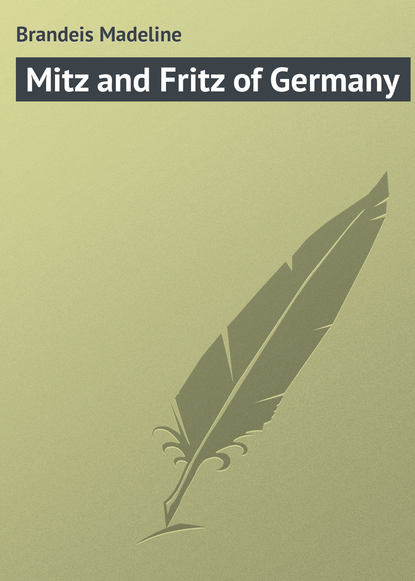По всем вопросам обращайтесь на: info@litportal.ru
(©) 2003-2024.
✖
Mitz and Fritz of Germany
Настройки чтения
Размер шрифта
Высота строк
Поля
Mr. Toymaker was silent and sad. He wondered what would happen to them all if his business did not improve. A gypsy life was not very pleasant, after all. A cosy home was better for a German family.
In September there was to be an important fair in the city of Leipzig (Līp´sĭk). Mr. Toymaker determined to be there. But until then they would be obliged to wander.
One day they approached the town of Ströbeck.
"Ah," said Mr. Toymaker, "we are in time for the great chess festival. People who are interested in chess come to this festival from far and near. Let us stop."
Mitzi, who was busily sewing, looked up.
"What is chess?" she asked. "Is it like cheese? Is it good to eat?"
Mrs. Toymaker laughed, "No, no, little hungry one! It is a game played on a board like checkers. This town is the only one in the world where children learn chess in school."
"In school?" asked Fritz.
"Yes," said Mrs. Toymaker. "During certain months each child goes to school with his chessboard. Children learn the old game just as you learn arithmetic."
"I think I would like that better than arithmetic," said Fritz.
"But it is a difficult game," said Mrs. Toymaker.
They made their camp near the peaceful town of Ströbeck. They noticed some peasant girls tending geese in a field.
"See, Mother," said Mitzi. "They play chess while they watch the geese."
"During the World War," said Mrs. Toymaker, "the Ströbeck money was printed with colored chessboards and chessmen upon it."
Later, the family made their way to the public square. The children enjoyed the parade of strangely dressed people. There were kings, queens, bishops and knights marching along. They represented the chessmen with which the game is played. The whole town was in a very gay mood.
Mr. Toymaker sold enough toys to cheer him somewhat. After supper they sat outside their wagon, and Mrs. Toymaker told them all she knew about this strange place.
"Chess is an ancient game," she said. "Ströbeck has been playing it for many years. Children begin to learn it when they are still babies. There once lived a boy of seven who became a champion. He even beat the village schoolmaster."
Fritz liked to hear these stories. He listened eagerly. But Mitz had only one thought these days. That thought was the costume for Fritz.
She had her eye upon the yellow curtains of the wagon. How fine they would be for her purpose! The family traveled further, and all the time Mitzi sewed. Slowly the costume grew, but too slowly for Mitzi.
One day when Mrs. Toymaker returned from the market place, she thought surely her eyes were playing her tricks. The windows of their wagon looked crooked. Then out came Mitzi. And what had happened to Mitzi? She looked crooked, too!
"Mitz, what have you done to the curtains?" asked Mrs. Toymaker.
Before Mitzi could reply, Mrs. Toymaker understood why Mitzi looked crooked. Her little red skirt was hanging in a strange, uneven way. Mrs. Toymaker inspected the curtains.
"Mitzi!" she said sternly. "You have cut pieces off the top of the curtains and tried to sew them together again."
Mitzi said nothing, but her face was flushed.
"Oh, Mitz!" continued Mrs. Toymaker. "You have cut pieces off your red skirt and tried to sew it together, too. Now it is hanging all wrong. You naughty little girl!"
Fritz was out gathering wood for the fire. Mitzi had worked alone and quickly.
"I do not know what you are up to, Mitzi," said her mother. "But you must be punished for this."
So for three days Mitzi was made to stay in the wagon alone. She could not go with the family to market. She had to eat her meals alone. She had to eat black bread and drink water like a prisoner. This was very hard for sausage-loving Mitz. She was in disgrace.
However, she bore her punishment like a man. She knew that she had done wrong. She helped her mother to arrange the curtains and to fix her skirt. She said nothing. But all the time she knew that soon the brightly colored little cloak would be finished.
CHAPTER XI
EISENACH AND BACH
"Our great chance will come in Leipzig," said Mitzi.
She was sitting on the steps of their wagon, sewing. Fritz sat beside her. He held an open book in his hands.
The Toymakers had made their camp outside of Eisenach (Ī´zĕn-äk). Mr. and Mrs. Toymaker had gone to town, leaving Mitz and Fritz with the wagon. Mitzi wanted to finish that costume before they arrived in Leipzig. Fritz was reading about Johann Sebastian Bach (Bäk), who was born in Eisenach.
"Bach came from a family of musicians," read Fritz. "The name 'Bach' means 'brook.' Beethoven once said, 'He is not a brook but an ocean!'"
"Come," interrupted Mitzi. "Try on the cloak. I am afraid I have made it too large."
"No," said Fritz, as he tried it on. "It fits me perfectly. How pretty it is, and how clever is my Mitz!"
Mitzi waggled her head proudly.
She said, "Many people will be in Leipzig for the fair. When you give your concert, I'll fetch Father and bring him to where you are playing. Oh, how surprised and pleased he'll be!"
Fritz smiled. Then he went on reading from his book while Mitzi sewed.
"'When Bach was a boy,'" read Fritz, "'his father died and he lived with his brother Christoph. One day Christoph brought home a book full of beautiful music. The little boy longed to play it. But Christoph was jealous of Sebastian's talent. He refused to let him have the music book and locked it up.
"'Poor Sebastian wanted very much to play that music. So every night he got up and stole downstairs into the music room. He pulled the book out from between the bars of the bookcase. He sat in the light of the moon and copied the notes.
"'At last, after many weeks, he had copied the whole volume. He went to sleep with his work under his pillow. He was very happy. But next day a terrible thing occurred. While Sebastian was playing the music on the harpsichord, his brother Christoph came in. When Christoph saw what the boy had done, he took away Sebastian's precious copy book.'"
"And what happened then?" asked Mitzi.
She was interested in this poor little fellow who had longed so much for music. She was very angry with the brother.
Fritz read on: "'Sebastian fell ill. He was so unhappy that he could not eat. Then, one day he discovered that he could play the beautiful music without notes. It was all written in his heart!'"
"Ah," said Mitzi. "That is good!"
"'But just as he was playing it,'" continued Fritz, "'in came his brother Christoph again – '"
"The goose!" sniffed Mitzi.
"'Christoph stood in the doorway listening,'" read Fritz. "'At first he was ready to stop the playing. But at last it dawned upon him that his little brother was truly a great artist.'"
In September there was to be an important fair in the city of Leipzig (Līp´sĭk). Mr. Toymaker determined to be there. But until then they would be obliged to wander.
One day they approached the town of Ströbeck.
"Ah," said Mr. Toymaker, "we are in time for the great chess festival. People who are interested in chess come to this festival from far and near. Let us stop."
Mitzi, who was busily sewing, looked up.
"What is chess?" she asked. "Is it like cheese? Is it good to eat?"
Mrs. Toymaker laughed, "No, no, little hungry one! It is a game played on a board like checkers. This town is the only one in the world where children learn chess in school."
"In school?" asked Fritz.
"Yes," said Mrs. Toymaker. "During certain months each child goes to school with his chessboard. Children learn the old game just as you learn arithmetic."
"I think I would like that better than arithmetic," said Fritz.
"But it is a difficult game," said Mrs. Toymaker.
They made their camp near the peaceful town of Ströbeck. They noticed some peasant girls tending geese in a field.
"See, Mother," said Mitzi. "They play chess while they watch the geese."
"During the World War," said Mrs. Toymaker, "the Ströbeck money was printed with colored chessboards and chessmen upon it."
Later, the family made their way to the public square. The children enjoyed the parade of strangely dressed people. There were kings, queens, bishops and knights marching along. They represented the chessmen with which the game is played. The whole town was in a very gay mood.
Mr. Toymaker sold enough toys to cheer him somewhat. After supper they sat outside their wagon, and Mrs. Toymaker told them all she knew about this strange place.
"Chess is an ancient game," she said. "Ströbeck has been playing it for many years. Children begin to learn it when they are still babies. There once lived a boy of seven who became a champion. He even beat the village schoolmaster."
Fritz liked to hear these stories. He listened eagerly. But Mitz had only one thought these days. That thought was the costume for Fritz.
She had her eye upon the yellow curtains of the wagon. How fine they would be for her purpose! The family traveled further, and all the time Mitzi sewed. Slowly the costume grew, but too slowly for Mitzi.
One day when Mrs. Toymaker returned from the market place, she thought surely her eyes were playing her tricks. The windows of their wagon looked crooked. Then out came Mitzi. And what had happened to Mitzi? She looked crooked, too!
"Mitz, what have you done to the curtains?" asked Mrs. Toymaker.
Before Mitzi could reply, Mrs. Toymaker understood why Mitzi looked crooked. Her little red skirt was hanging in a strange, uneven way. Mrs. Toymaker inspected the curtains.
"Mitzi!" she said sternly. "You have cut pieces off the top of the curtains and tried to sew them together again."
Mitzi said nothing, but her face was flushed.
"Oh, Mitz!" continued Mrs. Toymaker. "You have cut pieces off your red skirt and tried to sew it together, too. Now it is hanging all wrong. You naughty little girl!"
Fritz was out gathering wood for the fire. Mitzi had worked alone and quickly.
"I do not know what you are up to, Mitzi," said her mother. "But you must be punished for this."
So for three days Mitzi was made to stay in the wagon alone. She could not go with the family to market. She had to eat her meals alone. She had to eat black bread and drink water like a prisoner. This was very hard for sausage-loving Mitz. She was in disgrace.
However, she bore her punishment like a man. She knew that she had done wrong. She helped her mother to arrange the curtains and to fix her skirt. She said nothing. But all the time she knew that soon the brightly colored little cloak would be finished.
CHAPTER XI
EISENACH AND BACH
"Our great chance will come in Leipzig," said Mitzi.
She was sitting on the steps of their wagon, sewing. Fritz sat beside her. He held an open book in his hands.
The Toymakers had made their camp outside of Eisenach (Ī´zĕn-äk). Mr. and Mrs. Toymaker had gone to town, leaving Mitz and Fritz with the wagon. Mitzi wanted to finish that costume before they arrived in Leipzig. Fritz was reading about Johann Sebastian Bach (Bäk), who was born in Eisenach.
"Bach came from a family of musicians," read Fritz. "The name 'Bach' means 'brook.' Beethoven once said, 'He is not a brook but an ocean!'"
"Come," interrupted Mitzi. "Try on the cloak. I am afraid I have made it too large."
"No," said Fritz, as he tried it on. "It fits me perfectly. How pretty it is, and how clever is my Mitz!"
Mitzi waggled her head proudly.
She said, "Many people will be in Leipzig for the fair. When you give your concert, I'll fetch Father and bring him to where you are playing. Oh, how surprised and pleased he'll be!"
Fritz smiled. Then he went on reading from his book while Mitzi sewed.
"'When Bach was a boy,'" read Fritz, "'his father died and he lived with his brother Christoph. One day Christoph brought home a book full of beautiful music. The little boy longed to play it. But Christoph was jealous of Sebastian's talent. He refused to let him have the music book and locked it up.
"'Poor Sebastian wanted very much to play that music. So every night he got up and stole downstairs into the music room. He pulled the book out from between the bars of the bookcase. He sat in the light of the moon and copied the notes.
"'At last, after many weeks, he had copied the whole volume. He went to sleep with his work under his pillow. He was very happy. But next day a terrible thing occurred. While Sebastian was playing the music on the harpsichord, his brother Christoph came in. When Christoph saw what the boy had done, he took away Sebastian's precious copy book.'"
"And what happened then?" asked Mitzi.
She was interested in this poor little fellow who had longed so much for music. She was very angry with the brother.
Fritz read on: "'Sebastian fell ill. He was so unhappy that he could not eat. Then, one day he discovered that he could play the beautiful music without notes. It was all written in his heart!'"
"Ah," said Mitzi. "That is good!"
"'But just as he was playing it,'" continued Fritz, "'in came his brother Christoph again – '"
"The goose!" sniffed Mitzi.
"'Christoph stood in the doorway listening,'" read Fritz. "'At first he was ready to stop the playing. But at last it dawned upon him that his little brother was truly a great artist.'"










